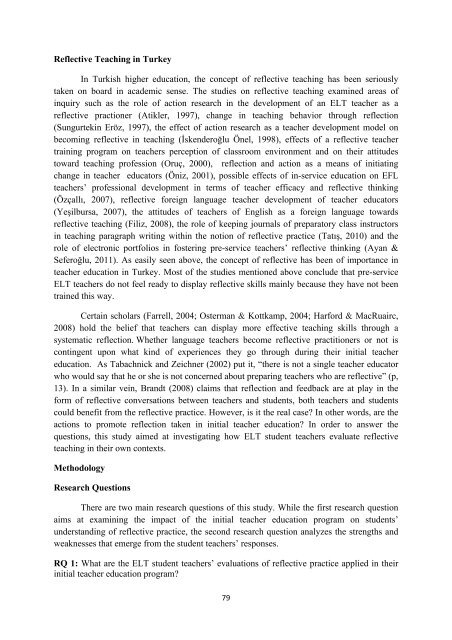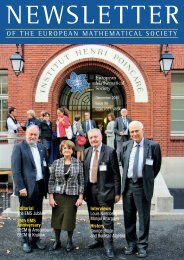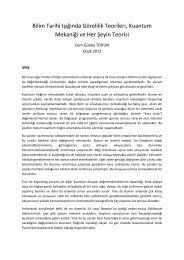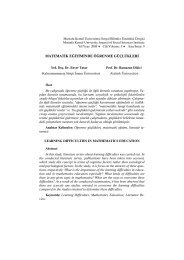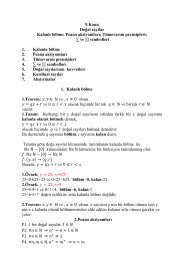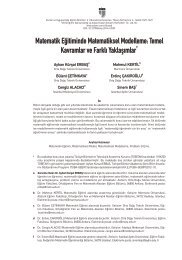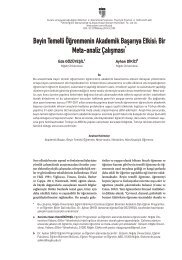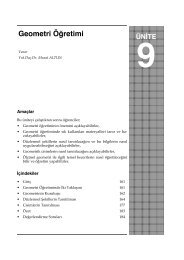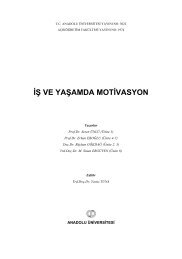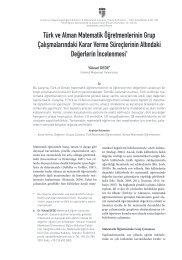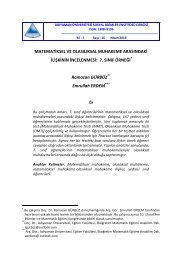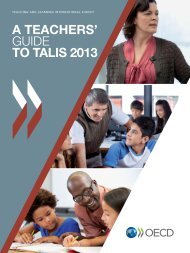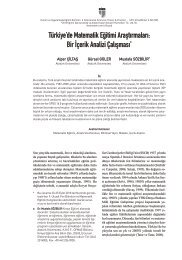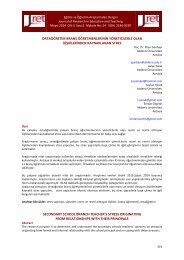IntroductionThe concept of learning has gone through various alterations in line with learningrelatedconcepts such as constructivism, cooperative learning and social learning in recentyears. These alterations have shifted the concept of learning to “an active process wherelearners are expected to reflect upon their current and past knowledge and experiences togenerate new ideas and concepts” (Cunningham, 2001, p. 2). This perspective pinpoints theimportance of reflection as an instrument that operates as a catalyst of students’ effectivelearning and achievement. In order for students to experience reflection, their teachersthemselves need to be reflective about their own teaching. This refers to the question of howthis is achieved during their initial teacher education. Therefore, raising awareness about theuse and function of reflection among student teachers is a critical matter in initial teachereducation. The present study analyzes the evaluation of an ELT (English LanguageTeaching) teacher education program from student teachers’ perspective.There is no doubt that reflection is of paramount importance and has receivedsubstantial attention in learning contexts. As for language learning settings, reflection hasemerged as a very response to call for a substitute for innovative learning approaches.According to Dam (1995), it is teacher’s responsibility to enable students to develop theirreflective skills. This has led to the idea of empowering teachers as reflective practionersduring their initial teacher education. The idea of empowering student teachers as reflectivepractioners has been a concept that is “entrenched in the literature and discourses of teachereducation and teachers’ professional development” (Ottesen, 2007, p. 31). That is to say, onecan come across numerous references to the concept of reflective teaching (Griffiths, 2000;Jay & Johnson, 2002; Cornford, 2002; Vieira & Marques, 2002; Clarke & Otaky, 2006;Akbari, 2007) that address different dimensions and dynamics of the concept.As opposed to two teacher education approaches namely Applied Science and CraftModel (Wallace, 1991), reflective teaching is claimed to be more effective than precedingapproaches to teacher education in that it offers observing, examining, evaluating skills as theprocess of teacher’s thinking critically about what happens in the classroom. As Richards(2002) states, “teachers should not set out to look for a general method of teaching or tomaster a particular set of teaching skills but should constantly try to discover things that workby discarding old practices and taking on board new ones” (p. 24). According to Pacheco(2005, p. 3), reflection, as an instrument of professional development, “enables ELTprofessionals to actively react, examine and evaluate their teaching to make decisions onnecessary changes to improve attitudes, beliefs and practices”.Considering the critical role of teacher beliefs in practices of teachers and theirresistance to change (Pajeras, 1992), it is important to examine whether a teacher educationprogram prepared in line with the theory and practice of reflective approach is able to offer acontext in which student teachers are exposed to reflective practices. To this end, this studyfocuses on the impact of an initial teacher education on student teachers’ understanding ofreflection and its various educational outputs that relate to educating competent Englishlanguage teachers. This study may illuminate the approach of teacher educators to design anddevelop more dynamic and effective programs.78
Reflective Teaching in TurkeyIn Turkish higher education, the concept of reflective teaching has been seriouslytaken on board in academic sense. The studies on reflective teaching examined areas ofinquiry such as the role of action research in the development of an ELT teacher as areflective practioner (Atikler, 1997), change in teaching behavior through reflection(Sungurtekin Eröz, 1997), the effect of action research as a teacher development model onbecoming reflective in teaching (İskenderoğlu Önel, 1998), effects of a reflective teachertraining program on teachers perception of classroom environment and on their attitudestoward teaching profession (Oruç, 2000), reflection and action as a means of initiatingchange in teacher educators (Öniz, 2001), possible effects of in-service education on EFLteachers’ professional development in terms of teacher efficacy and reflective thinking(Özçallı, 2007), reflective foreign language teacher development of teacher educators(Yeşilbursa, 2007), the attitudes of teachers of English as a foreign language towardsreflective teaching (Filiz, 2008), the role of keeping journals of preparatory class instructorsin teaching paragraph writing within the notion of reflective practice (Tatış, 2010) and therole of electronic portfolios in fostering pre-service teachers’ reflective thinking (Ayan &Seferoğlu, 2011). As easily seen above, the concept of reflective has been of importance inteacher education in Turkey. Most of the studies mentioned above conclude that pre-serviceELT teachers do not feel ready to display reflective skills mainly because they have not beentrained this way.Certain scholars (Farrell, 2004; Osterman & Kottkamp, 2004; Harford & MacRuairc,2008) hold the belief that teachers can display more effective teaching skills through asystematic reflection. Whether language teachers become reflective practitioners or not iscontingent upon what kind of experiences they go through during their initial teachereducation. As Tabachnick and Zeichner (2002) put it, “there is not a single teacher educatorwho would say that he or she is not concerned about preparing teachers who are reflective” (p,13). In a similar vein, Brandt (2008) claims that reflection and feedback are at play in theform of reflective conversations between teachers and students, both teachers and studentscould benefit from the reflective practice. However, is it the real case? In other words, are theactions to promote reflection taken in initial teacher education? In order to answer thequestions, this study aimed at investigating how ELT student teachers evaluate reflectiveteaching in their own contexts.MethodologyResearch QuestionsThere are two main research questions of this study. While the first research questionaims at examining the impact of the initial teacher education program on students’understanding of reflective practice, the second research question analyzes the strengths andweaknesses that emerge from the student teachers’ responses.RQ 1: What are the ELT student teachers’ evaluations of reflective practice applied in theirinitial teacher education program?79
- Page 1 and 2:
ISSN: 2146-7676UFUK ÜNİVERSİTES
- Page 3 and 4:
UFUK ÜNİVERSİTESİSOSYAL BİLİM
- Page 5 and 6:
SUNUŞDergimizin 2014 yılı ilk sa
- Page 7 and 8:
A NEED-BASED EVALUATIONOF A PREPARA
- Page 9 and 10:
In the literature on language teach
- Page 11 and 12:
focus teaching on this. Accordingly
- Page 13:
International Relations) were 20 (7
- Page 16 and 17:
questionnaire in their English-medi
- Page 18 and 19:
REFERENCESAlagözlü, N. K. (1984).
- Page 20 and 21:
APPENDIX A1 STUDENT QUESTIONNAIRE
- Page 23 and 24:
24. Converting short notes into
- Page 27 and 28: The Role Of Gender On University St
- Page 29 and 30: (Johnson 2001; Türküm, 2005). Joh
- Page 31 and 32: Table 1 : Means and Standard Deviat
- Page 33 and 34: 2.3 ProcedureEthical permission to
- Page 35 and 36: age and attitude toward help seekin
- Page 37 and 38: Economics and Administrative Scienc
- Page 39 and 40: REFERENCESAddis, M. E., & Mahalik,
- Page 41 and 42: Koydemir-Özden, S. (2010). Self-as
- Page 43 and 44: LİSE ÖĞRENCİLERİNİN MESLEKİ
- Page 45 and 46: göre mesleki bakımdan daha önce
- Page 47 and 48: Araştırmanın amacıMesleki olgun
- Page 49 and 50: Tablo 1: Lise Öğrencilerinin Mesl
- Page 51 and 52: Lise öğrencilerinin karar verme s
- Page 53 and 54: KAYNAKÇA Acıbozlar, Ö. (2006). Y
- Page 55: Oğuz, Ö. (2008). Lise öğrencile
- Page 58 and 59: 1. IntroductionDifferent from the p
- Page 60 and 61: noteworthy to mention that multilin
- Page 62 and 63: The findings indicate that multilin
- Page 64 and 65: Table 1. Descriptives statistics fo
- Page 66 and 67: overall six factor structure which
- Page 68 and 69: wider variety of strategies with a
- Page 70 and 71: inclusion of instructors who are no
- Page 72 and 73: Gardner, R. C., & MacIntyre, P. D.
- Page 74 and 75: AppendicesAppendix A- English Profi
- Page 77: ELT Student Teachers’ Evaluations
- Page 81 and 82: Table 1: Reliability Analysis o
- Page 83 and 84: Table 4: Mean and standard dev
- Page 85 and 86: Table 9: Mean and standard dev
- Page 87 and 88: ReferencesAkbari, R. (2007). Reflec
- Page 89: Pollard, A. & Triggs, P. (1997) Ref
- Page 92 and 93: 1. GİRİŞEğitim ve program geli
- Page 94 and 95: Genelgeçer tek bir bilimsel sürec
- Page 96 and 97: Program geliştirmedeki yenilikleri
- Page 98 and 99: -Elde ettiği sonuçlardan hareket
- Page 100 and 101: “İnternet Üzerinden Öğrenme
- Page 102 and 103: de sınıf içi dersler de öğrenm
- Page 104 and 105: teknik ve pedagojik uzmanlar gerekt
- Page 106 and 107: 3. Proje ekibinin kurulması4. Plan
- Page 108 and 109: KAYNAKÇABigdoli, H. (2004). The In
- Page 110 and 111: 110
- Page 112 and 113: Hiçbir öğrenci bir diğeriyle ay
- Page 114 and 115: İçerik sınıfta nelerin öğreti
- Page 116 and 117: (MEB, 2006; Tomlinson, 2005). Ek ol
- Page 118 and 119: - Öğrencilerden gereksinim duyduk
- Page 120 and 121: desteklerine gereksinim duydukları
- Page 122 and 123: KAYNAKÇAAlberto P. A, ve Troutman
- Page 124 and 125: 124
- Page 126 and 127: 1.GİRİŞBuradaki araştırma OECD
- Page 128 and 129:
öğretilenleri almışlar mı diye
- Page 130 and 131:
edileceğini araştırmaz, ancak bu
- Page 132 and 133:
yaşarlar: Çok fazla sayıda koşu
- Page 134 and 135:
• Birincil Stratejiler ve Destek
- Page 136 and 137:
ir dönemdir. Özellikle artan yaş
- Page 138 and 139:
2. Hipotez: Öğretmenlerin coğraf
- Page 140 and 141:
Tablo 7 Öğretmenlerin Coğrafi
- Page 142 and 143:
stratejileri”ne yönelik bilişse
- Page 144 and 145:
sonuçları χ 2 (12, N =407) = 13,
- Page 146 and 147:
sebebiyet verir. Bunun önemli bir
- Page 148 and 149:
KAYNAKÇAArtelt, C., Stanat, P., Sc
- Page 150 and 151:
Lieteratur. 10. Sonderheft: Lesesoz
- Page 152 and 153:
YAYIM ALANI, YAZIM KURALLARI ve YAZ
- Page 154:
• Birebir alımlar “…” İş


